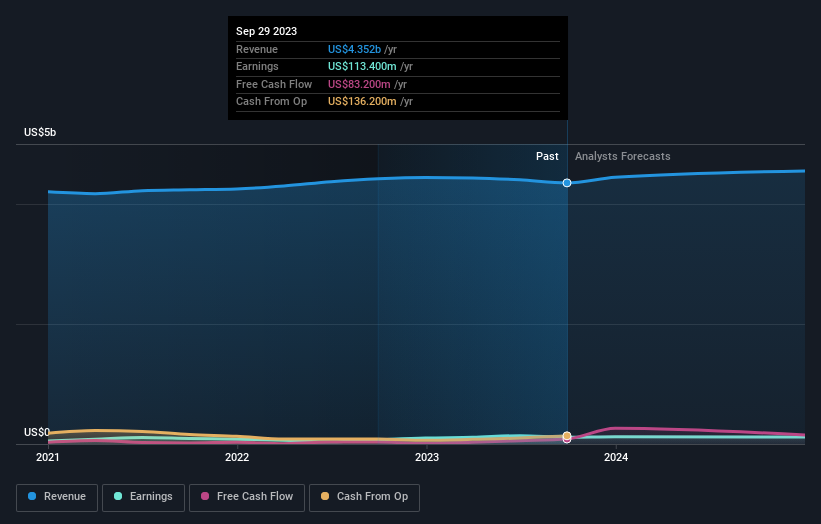A fantastic week for Fresh Del Monte Produce Inc.'s (NYSE:FDP) 64% institutional owners, one-year returns continue to impress
Key Insights
Significantly high institutional ownership implies Fresh Del Monte Produce's stock price is sensitive to their trading actions
A total of 5 investors have a majority stake in the company with 50% ownership
To get a sense of who is truly in control of Fresh Del Monte Produce Inc. (NYSE:FDP), it is important to understand the ownership structure of the business. With 64% stake, institutions possess the maximum shares in the company. Put another way, the group faces the maximum upside potential (or downside risk).
And things are looking up for institutional investors after the company gained US$51m in market cap last week. One-year return to shareholders is currently 2.5% and last week’s gain was the icing on the cake.
Let's take a closer look to see what the different types of shareholders can tell us about Fresh Del Monte Produce.
See our latest analysis for Fresh Del Monte Produce
What Does The Institutional Ownership Tell Us About Fresh Del Monte Produce?
Institutions typically measure themselves against a benchmark when reporting to their own investors, so they often become more enthusiastic about a stock once it's included in a major index. We would expect most companies to have some institutions on the register, especially if they are growing.
We can see that Fresh Del Monte Produce does have institutional investors; and they hold a good portion of the company's stock. This implies the analysts working for those institutions have looked at the stock and they like it. But just like anyone else, they could be wrong. If multiple institutions change their view on a stock at the same time, you could see the share price drop fast. It's therefore worth looking at Fresh Del Monte Produce's earnings history below. Of course, the future is what really matters.
Investors should note that institutions actually own more than half the company, so they can collectively wield significant power. Fresh Del Monte Produce is not owned by hedge funds. The company's CEO Mohammad Abu-Ghazaleh is the largest shareholder with 14% of shares outstanding. For context, the second largest shareholder holds about 12% of the shares outstanding, followed by an ownership of 9.2% by the third-largest shareholder.
On looking further, we found that 50% of the shares are owned by the top 5 shareholders. In other words, these shareholders have a meaningful say in the decisions of the company.
Researching institutional ownership is a good way to gauge and filter a stock's expected performance. The same can be achieved by studying analyst sentiments. There is a little analyst coverage of the stock, but not much. So there is room for it to gain more coverage.
Insider Ownership Of Fresh Del Monte Produce
While the precise definition of an insider can be subjective, almost everyone considers board members to be insiders. The company management answer to the board and the latter should represent the interests of shareholders. Notably, sometimes top-level managers are on the board themselves.
Most consider insider ownership a positive because it can indicate the board is well aligned with other shareholders. However, on some occasions too much power is concentrated within this group.
It seems insiders own a significant proportion of Fresh Del Monte Produce Inc.. It is very interesting to see that insiders have a meaningful US$271m stake in this US$1.3b business. Most would be pleased to see the board is investing alongside them. You may wish to access this free chart showing recent trading by insiders.
General Public Ownership
With a 15% ownership, the general public, mostly comprising of individual investors, have some degree of sway over Fresh Del Monte Produce. This size of ownership, while considerable, may not be enough to change company policy if the decision is not in sync with other large shareholders.
Next Steps:
While it is well worth considering the different groups that own a company, there are other factors that are even more important. Consider for instance, the ever-present spectre of investment risk. We've identified 2 warning signs with Fresh Del Monte Produce (at least 1 which doesn't sit too well with us) , and understanding them should be part of your investment process.
Ultimately the future is most important. You can access this free report on analyst forecasts for the company.
NB: Figures in this article are calculated using data from the last twelve months, which refer to the 12-month period ending on the last date of the month the financial statement is dated. This may not be consistent with full year annual report figures.
Have feedback on this article? Concerned about the content? Get in touch with us directly. Alternatively, email editorial-team (at) simplywallst.com.
This article by Simply Wall St is general in nature. We provide commentary based on historical data and analyst forecasts only using an unbiased methodology and our articles are not intended to be financial advice. It does not constitute a recommendation to buy or sell any stock, and does not take account of your objectives, or your financial situation. We aim to bring you long-term focused analysis driven by fundamental data. Note that our analysis may not factor in the latest price-sensitive company announcements or qualitative material. Simply Wall St has no position in any stocks mentioned.


